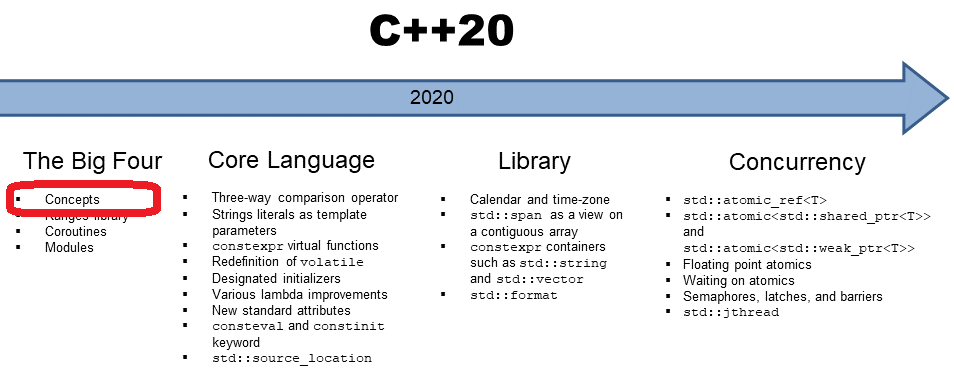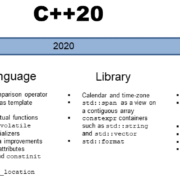C++ Core Guidelines: Rules for the Usage of Concepts
We will get concepts with high probability in C++20. Here are the rules from the C++ core guidelines to use them.

First, let me go one step back. What are concepts?
- Concepts are a compile-time predicate. This means concepts can be evaluated at compile-time and return a boolean.
The following questions are. What are the pros of concepts in C++?
Concepts
- Empower programmers to express their requirements as part of the interface directly.
- Support the overloading of functions and the specialization of class templates based on the requirements of the template parameters.
- Produce drastically improved error messages by comparing the requirements of the template parameter with the applied template arguments.
- It can be used as placeholders for generic programming.
- Empower you to define your concepts.
Now, one step forward. Here are the four rules for today:
- T.10: Specify concepts for all template arguments
- T.11: Whenever possible, use standard concepts
- T.12: Prefer concept names over
autofor local variables - T.13: Prefer the shorthand notation for simple, single-type argument concepts
Let’s start with the first rule.
T.10: Specify concepts for all template arguments
There is not much to add to this rule. Because of correctness and readability, you should use concepts for all template parameters. You can do it in a verbose way.

 Modernes C++ Mentoring
Modernes C++ Mentoring
Do you want to stay informed: Subscribe.
template<typename T> requires Integral<T>() T gcd(T a, T b){ if( b == 0 ){ return a; } else{ return gcd(b, a % b); } }
Or you can do it more concisely.
template<Integral T> T gcd(T a, T b){ if( b == 0 ){ return a; } else{ return gcd(b, a % b); } }
In the first example, I specify the concept in the required clause, but I can use the concept Integral just in place of the keyword typename or class. The concept Integral has to be a constant expression that returns a boolean.
I created the concept by using std::is_integral from the type traits library.
template<typename T> concept bool Integral(){ return std::is_integral<T>::value; }
Defining your concepts, as I did, is not the best idea.
T.11: Whenever possible, use standard concepts
Okay, if possible, you should use the concepts from the Guidelines Support Library (GSL) or the Ranges TS. Let’s see what we have. I ignore the concepts of the GSL because they are mainly part of the Ranges TS. Here are the concepts of the Range TS from the document N4569: Working Draft, C++ Extension for Ranges.
Core language concepts
SameDerivedFromConvertibleToCommonIntegralSigned IntegralUnsigned IntegralAssignableSwappable
Comparison concepts
BooleanEqualityComparableStrictTotallyOrdered
Object concepts
DestructibleConstructibleDefaultConstructibleMoveConstructibleCopy ConstructibleMovableCopyableSemiregularRegular
Callable concepts
CallableRegularCallablePredicateRelationStrictWeakOrder
If you want to know what each of these concepts means, the already mentioned document N4569 gives you the answers. The concept definitions are based on the type traits library. Here are for example, the definitions of the concepts Integral, Signed Integral, and Unsigned Integral.
template <class T> concept bool Integral() { return is_integral<T>::value; } template <class T> concept bool SignedIntegral() { return Integral<T>() && is_signed<T>::value; } template <class T> concept bool UnsignedIntegral() { return Integral<T>() && !SignedIntegral<T>(); }
The functions std::is_integral<T> and std::is_signed<T> are predicates from the type traits library.
Additionally, the names are used in the text of the C++ standard to define the expectations of the standard library. They are concepts that are not enforced but document the requirement for an algorithm, such as std::sort.
template< class RandomIt > void sort( RandomIt first, RandomIt last );
The first overload of std::sort requires two RandomAccessIterator. Now, I have to say what a RandomAccessIterator is:
- A RandomAccessIterator is a BidirectionalIterator that can be moved to point to any element in constant time.
- A BidirectionalIterator is a ForwardIterator that can be moved in both directions
- A ForwardIterator is an Iterator that can read data from the pointed-to element.
- The Iterator requirements describe types that can be used to identify and traverse the elements of a container.
For the details to the named requirements used in the text of the C++ standard, read cppreference.com.
T.12: Prefer concept names over auto for local variables
auto is an unconstrained concept (placeholder), but you should use constrained concepts. You can use constrained concepts in each situation, where you can use unconstrained placeholders (auto). If this is not an intuitive rule?
Here is an example to make my point.
// constrainedUnconstrainedConcepts.cpp #include <iostream> #include <type_traits> #include <vector> template<typename T> // (1) concept bool Integral(){ return std::is_integral<T>::value; } int getIntegral(int val){ return val * 5; } int main(){ std::cout << std::boolalpha << std::endl; std::vector<int> myVec{1, 2, 3, 4, 5}; for (Integral& i: myVec) std::cout << i << " "; // (2) std::cout << std::endl; Integral b= true; // (3) std::cout << b << std::endl; Integral integ= getIntegral(10); // (4) std::cout << integ << std::endl; auto integ1= getIntegral(10); // (5) std::cout << integ1 << std::endl; std::cout << std::endl; }
I defined the concept Integral in line (1). Hence I iterate over integrals in the range-based for-loop in line (2), and the variables b and integ inline (3) and (4) have to be integrals. I’m not so strict in line (5). Here I’m okay with an unconstrained concept.
In the end, the output of the program.

T.13: Prefer the shorthand notation for simple, single-type argument concepts
The example from the C++ Core Guidelines looks quite innocent but has the potential to revolutionize the way we write templates. Here it is.
template<typename T> // Correct but verbose: "The parameter is // requires Sortable<T> // of type T which is the name of a type void sort(T&); // that is Sortable" template<Sortable T> // Better (assuming support for concepts): "The parameter is of type T void sort(T&); // which is Sortable" void sort(Sortable&); // Best (assuming support for concepts): "The parameter is Sortable"
This example shows three variations to declare the function template sort. All variations are semantically equivalent and require that the template parameter supports the concept Sortable. The last variation looks like a function declaration but is a function template declaration because the parameter is a concept, not a concrete type. To say it once more: sort becomes due to the concept parameter of a function template.
What’s next?
The C++ core guidelines say: “Defining good concepts is non-trivial. Concepts are meant to represent fundamental concepts in an application domain.” Let’s see what that means in my next post.
Thanks a lot to my Patreon Supporters: Matt Braun, Roman Postanciuc, Tobias Zindl, G Prvulovic, Reinhold Dröge, Abernitzke, Frank Grimm, Sakib, Broeserl, António Pina, Sergey Agafyin, Андрей Бурмистров, Jake, GS, Lawton Shoemake, Jozo Leko, John Breland, Venkat Nandam, Jose Francisco, Douglas Tinkham, Kuchlong Kuchlong, Robert Blanch, Truels Wissneth, Mario Luoni, Friedrich Huber, lennonli, Pramod Tikare Muralidhara, Peter Ware, Daniel Hufschläger, Alessandro Pezzato, Bob Perry, Satish Vangipuram, Andi Ireland, Richard Ohnemus, Michael Dunsky, Leo Goodstadt, John Wiederhirn, Yacob Cohen-Arazi, Florian Tischler, Robin Furness, Michael Young, Holger Detering, Bernd Mühlhaus, Stephen Kelley, Kyle Dean, Tusar Palauri, Juan Dent, George Liao, Daniel Ceperley, Jon T Hess, Stephen Totten, Wolfgang Fütterer, Matthias Grün, Phillip Diekmann, Ben Atakora, Ann Shatoff, Rob North, Bhavith C Achar, Marco Parri Empoli, Philipp Lenk, Charles-Jianye Chen, Keith Jeffery, Matt Godbolt, and Honey Sukesan.
Thanks, in particular, to Jon Hess, Lakshman, Christian Wittenhorst, Sherhy Pyton, Dendi Suhubdy, Sudhakar Belagurusamy, Richard Sargeant, Rusty Fleming, John Nebel, Mipko, Alicja Kaminska, Slavko Radman, and David Poole.
| My special thanks to Embarcadero |  |
| My special thanks to PVS-Studio |  |
| My special thanks to Tipi.build |  |
| My special thanks to Take Up Code |  |
| My special thanks to SHAVEDYAKS |  |
Modernes C++ GmbH
Modernes C++ Mentoring (English)
Rainer Grimm
Yalovastraße 20
72108 Rottenburg
Mail: schulung@ModernesCpp.de
Mentoring: www.ModernesCpp.org
Modernes C++ Mentoring,








Leave a Reply
Want to join the discussion?Feel free to contribute!